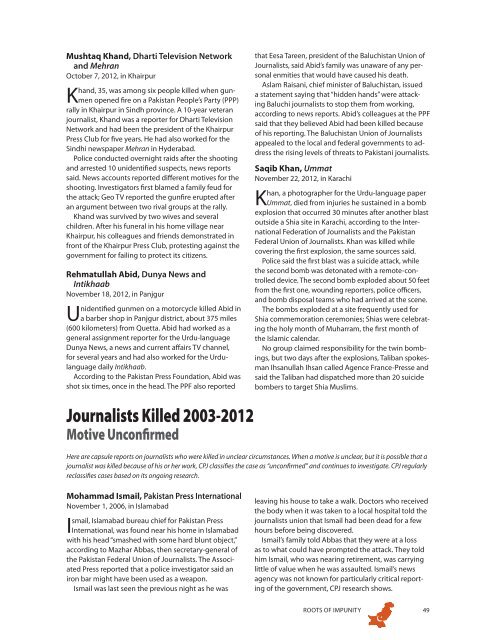CPJ.Pakistan.Roots.of.Impunity
CPJ.Pakistan.Roots.of.Impunity
CPJ.Pakistan.Roots.of.Impunity
You also want an ePaper? Increase the reach of your titles
YUMPU automatically turns print PDFs into web optimized ePapers that Google loves.
Mushtaq Khand, Dharti Television Network<br />
and Mehran<br />
October 7, 2012, in Khairpur<br />
Khand, 35, was among six people killed when gunmen<br />
opened fire on a <strong>Pakistan</strong> People’s Party (PPP)<br />
rally in Khairpur in Sindh province. A 10-year veteran<br />
journalist, Khand was a reporter for Dharti Television<br />
Network and had been the president <strong>of</strong> the Khairpur<br />
Press Club for five years. He had also worked for the<br />
Sindhi newspaper Mehran in Hyderabad.<br />
Police conducted overnight raids after the shooting<br />
and arrested 10 unidentified suspects, news reports<br />
said. News accounts reported different motives for the<br />
shooting. Investigators first blamed a family feud for<br />
the attack; Geo TV reported the gunfire erupted after<br />
an argument between two rival groups at the rally.<br />
Khand was survived by two wives and several<br />
children. After his funeral in his home village near<br />
Khairpur, his colleagues and friends demonstrated in<br />
front <strong>of</strong> the Khairpur Press Club, protesting against the<br />
government for failing to protect its citizens.<br />
Rehmatullah Abid, Dunya News and<br />
Intikhaab<br />
November 18, 2012, in Panjgur<br />
Unidentified gunmen on a motorcycle killed Abid in<br />
a barber shop in Panjgur district, about 375 miles<br />
(600 kilometers) from Quetta. Abid had worked as a<br />
general assignment reporter for the Urdu-language<br />
Dunya News, a news and current affairs TV channel,<br />
for several years and had also worked for the Urdulanguage<br />
daily Intikhaab.<br />
According to the <strong>Pakistan</strong> Press Foundation, Abid was<br />
shot six times, once in the head. The PPF also reported<br />
Journalists Killed 2003-2012<br />
Motive Unconfirmed<br />
that Eesa Tareen, president <strong>of</strong> the Baluchistan Union <strong>of</strong><br />
Journalists, said Abid’s family was unaware <strong>of</strong> any personal<br />
enmities that would have caused his death.<br />
Aslam Raisani, chief minister <strong>of</strong> Baluchistan, issued<br />
a statement saying that “hidden hands” were attacking<br />
Baluchi journalists to stop them from working,<br />
according to news reports. Abid’s colleagues at the PPF<br />
said that they believed Abid had been killed because<br />
<strong>of</strong> his reporting. The Baluchistan Union <strong>of</strong> Journalists<br />
appealed to the local and federal governments to address<br />
the rising levels <strong>of</strong> threats to <strong>Pakistan</strong>i journalists.<br />
Saqib Khan, Ummat<br />
November 22, 2012, in Karachi<br />
Khan, a photographer for the Urdu-language paper<br />
Ummat, died from injuries he sustained in a bomb<br />
explosion that occurred 30 minutes after another blast<br />
outside a Shia site in Karachi, according to the International<br />
Federation <strong>of</strong> Journalists and the <strong>Pakistan</strong><br />
Federal Union <strong>of</strong> Journalists. Khan was killed while<br />
covering the first explosion, the same sources said.<br />
Police said the first blast was a suicide attack, while<br />
the second bomb was detonated with a remote-controlled<br />
device. The second bomb exploded about 50 feet<br />
from the first one, wounding reporters, police <strong>of</strong>ficers,<br />
and bomb disposal teams who had arrived at the scene.<br />
The bombs exploded at a site frequently used for<br />
Shia commemoration ceremonies; Shias were celebrating<br />
the holy month <strong>of</strong> Muharram, the first month <strong>of</strong><br />
the Islamic calendar.<br />
No group claimed responsibility for the twin bombings,<br />
but two days after the explosions, Taliban spokesman<br />
Ihsanullah Ihsan called Agence France-Presse and<br />
said the Taliban had dispatched more than 20 suicide<br />
bombers to target Shia Muslims.<br />
Here are capsule reports on journalists who were killed in unclear circumstances. When a motive is unclear, but it is possible that a<br />
journalist was killed because <strong>of</strong> his or her work, <strong>CPJ</strong> classifies the case as “unconfirmed” and continues to investigate. <strong>CPJ</strong> regularly<br />
reclassifies cases based on its ongoing research.<br />
Mohammad Ismail, <strong>Pakistan</strong> Press International<br />
November 1, 2006, in Islamabad<br />
Ismail, Islamabad bureau chief for <strong>Pakistan</strong> Press<br />
International, was found near his home in Islamabad<br />
with his head “smashed with some hard blunt object,”<br />
according to Mazhar Abbas, then secretary-general <strong>of</strong><br />
the <strong>Pakistan</strong> Federal Union <strong>of</strong> Journalists. The Associated<br />
Press reported that a police investigator said an<br />
iron bar might have been used as a weapon.<br />
Ismail was last seen the previous night as he was<br />
leaving his house to take a walk. Doctors who received<br />
the body when it was taken to a local hospital told the<br />
journalists union that Ismail had been dead for a few<br />
hours before being discovered.<br />
Ismail’s family told Abbas that they were at a loss<br />
as to what could have prompted the attack. They told<br />
him Ismail, who was nearing retirement, was carrying<br />
little <strong>of</strong> value when he was assaulted. Ismail’s news<br />
agency was not known for particularly critical reporting<br />
<strong>of</strong> the government, <strong>CPJ</strong> research shows.<br />
ROOTS OF IMPUNITY 49


